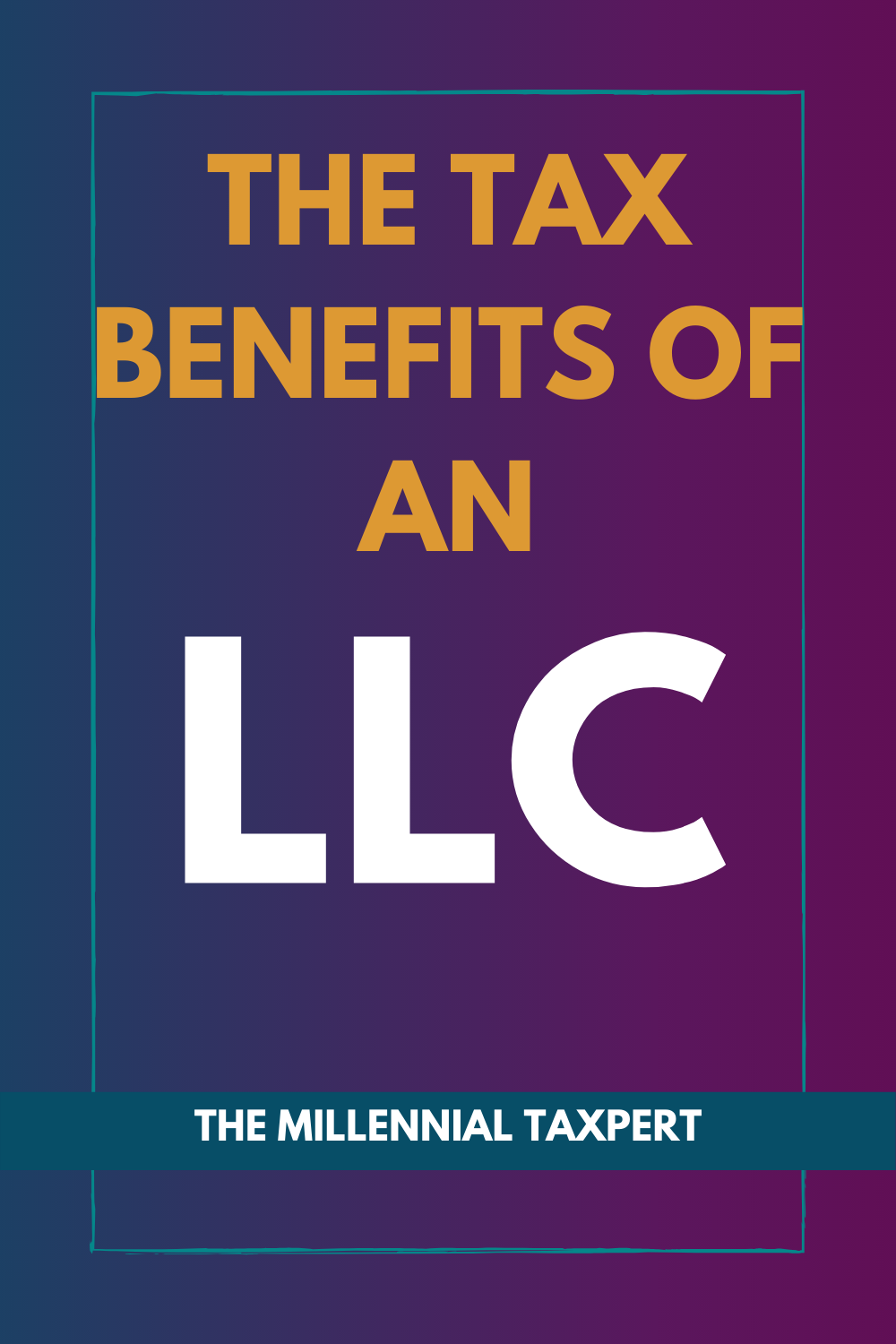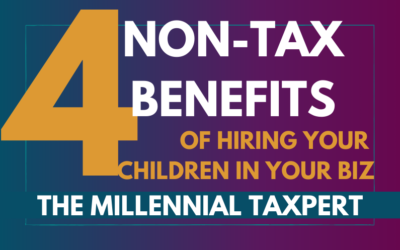Episode 31 | 23 Mins
What Are the Tax Benefits of an LLC?
You hear it all of the time. “Form an LLC so you can get the tax benefits.” But… what ARE the tax benefits?? The answer may actually surprise you. In this episode I explain how LLCs are taxed on federal tax returns.
Listen
Watch
Read
(this transcript has been edited to improve readability)
LLCs are a super popular choice of business entity for small businesses and investments and all kinds of different business activities. The most valid reason that people really go after LLCs is that LLCs actually do offer liability protection for the members of the LLC. If you are going to choose between an LLC and just being a sole proprietorship, just from a legal liability perspective an LLC usually is going to give you a better gonna give you better protection. If you’re a sole proprietor and somebody decides to sue your business, then they can take everything. They can take all your money, they can take your car, your house, they can take your dog. They can take the spoons out of the silverware drawer, but if your business is an LLC, then you can only lose what you’ve invested into the business. So that’s really, really, really the main benefit. Episode over. That’s it. That’s the whole reason that you get an LLC is for liability protection.
Of course, I’m going to talk a little bit more about LLCs and how they do affect you from a tax perspective. But really that’s the main benefit of having an LLC, versus doing a sole proprietorship, or a general partnership, because you have that limited liability that you would not have if you didn’t have an LLC. Well not, “if you didn’t have an LLC” because S corporations and corporations and some partnerships also do offer those limited liability protections. However, if it’s between being a sole proprietor or an LLC, the LLC is going to give you those additional benefits.
When you organize your business as an LLC, you are called a member. That’s just something to know. People who own corporations are called shareholders. People who have an interest in partnerships are called partners. People who own sole proprietorships are called sole proprietors, and people who own LLCs are called members. I don’t know why they’re called members versus owners or anything else, but they’re called members.
When you create an LLC, and you are the only owner of that LLC, your LLC is called a single-member LLC. And if you’re talking to people that are dealing with this all the time, you might see them abbreviate it as SMLLC. That just lets us know that there’s only one legal owner of the business. If you have more than one owner of the business, then you’re going to be called a multi-member LLC. And we abbreviate that by MMLLC. So if you’ve ever seen those and wasn’t really sure what that meant. All it means is there’s either one person that owns the LLC, or more than one person that owns the LLC. That’s it.
From a tax perspective, if your business is a single-member LLC it is going to be treated as a sole proprietorship. That’s because the IRS does not recognize LLCs for federal tax purposes. They’ll recognize it as a legal business entity, but when it comes to taxes, there are no separate tax laws that specifically relate to LLCs. LLCs don’t have a tax return. They don’t have specific tax laws that relate to that business. The IRS actually thinks about who owns the LLC, and then they treat the LLC based on the owners. If it’s a single-member LLC, they’re going to look through to the ownership and they’re going to say, “well, one person owns the LLC, and they haven’t elected to be treated as a different kind of taxable entity. So we’re going to treat them as a sole proprietorship. As far as we’re concerned, they woke up one day and decided they wanted to start a business. And that’s it. So they’re going to be treated as a sole proprietor.”
If you’re a single-member LLC, you will follow along with all the rules, as if your business is a sole proprietorship. You’re going to pay self-employment tax on your income. You’re going to report your income on your Schedule C. That income is going to flow through to your personal return from the Schedule C, and the return is going to be due April 15. It’s basically like you are just a 1099 or regular sole proprietor – all the rules that go along with being a regular sole proprietor will go with you as a single-member LLC that hasn’t been hasn’t made an election to be treated as a corporation, or an S Corp.
If there’s more than one owner of the LLC, then the IRS is going to treat you as if you are a partnership. If you and a friend decided to go into business together – sell t-shirts, bath bombs, jewelry, clothes, whatever – even if you don’t go down to the state and register the business, you’re still treated as a partnership. As long as you’ve made a decision to jointly go into business together for profit, you’re automatically considered a partnership. So that’s how the IRS is going to see you as a multi-member LLC.
From a federal tax perspective, you’re going to file your return on a form 1065. No, you cannot just report your portion of your income on a Schedule C on your return, and your partner report their portion of their income on Schedule C unless you’re considered to be a qualified joint venture. You’re going to file your return on Form 1065, which is due a month before individual returns are due. Then your share of the income is going to flow to you on a Schedule K-1. And then you’ll report your share of the income on your regular individual tax return. You’re going to pay self-employment tax if it’s a regular general partnership and you’re a general partner, which is the default. So you’re going to pay self-employment tax on your earnings as well as regular income tax and it’s all calculated on your personal return.
That’s really how it works from a tax perspective. And I want to mention that first because I want to put it out there and let you guys know that creating an LLC and doing nothing else other than going down to the state and creating that LLC does nothing for your taxes. It doesn’t matter. There’s absolutely no effect on your personal return from you going and creating an LLC, specifically. You could just one day wake up and decide that you want to sell plates. You can either decide to organize your business as an LLC, or you can choose not to, and just be a sole proprietorship. It’s going to be reported the same on your federal tax return anyway. Same with the partnership. When you have more than one person you can choose to go and create an LLC, or you can choose not to. It’s still going to work out the same on your federal tax return.
Now, from a state perspective, there may be some states – there are some states, California is the first one that comes to mind – that do recognize this actual entity for tax purposes. So for California, you will file your federal return if you’re a single-member LLC, you will file your federal return as a regular sole proprietorship, Schedule C. But then you would need to make some modifications on your state because your business will have to file a separate tax return for the state of California and pay the tax. Okay, because California does charge a minimum tax for their LLC. And if you are, if you do have an LLC, then you really and you are in California, you really want to look up the rules because their due dates for their tax returns and their payments are kind of weird. For California LLCs, their returns are usually due in advance as opposed to at the end of the year.
To reiterate: single-member & multi-member LLCs that haven’t made any kind of election to be a corporation or taxed as a corporation or an S Corp, from a federal tax perspective, nothing changes. Nothing.
When I say that you haven’t made an election to be treated as a corporation or an S corporation, that means you haven’t “checked the box”. So you might hear people say you “checked the box” which just means you’ve chosen to be treated as a C or S corporation. When you “check the box” or you make that election, your business entity, your LLC now becomes a separate federally recognized business entity for tax purposes, but it’s treated as a corporation or an S corp it’s still not being treated as an LLC because there’s no such thing.
If you don’t make that election, then your LLC is what’s called a “disregarded entity”. That means that the IRS is disregarding the legal structure of the business, for tax purposes only, and looking through to the ownership of the business. If you have a single-member LLC, and it’s disregarded, the IRS is going to treat you as a sole proprietor. If you have a multi-member LLC, and it’s disregarded, the IRS is going to treat you as a partnership. Now, if you have a regarded LLC, the IRS is going to treat you as whatever you’ve chosen to be treated as – a C Corp or an S Corp.
This is where you might start seeing some tax benefits. When people tell you to get an LLC, this is what they mean. But they never tell you about that second step. They just say go get an LLC, but they never say you need an LLC, and then once you get your LLC, you want to make sure you make an election to be treated as an S Corp because when you get treated as an S Corp now you might see some tax savings. The thing about that is, you don’t have to have an LLC to get S corp benefits. You can just have an S corp. So LLCs in and of themselves don’t really bring any special or specific tax breaks that you can’t get from a different business entity. Now, legally, there may be something there but strictly speaking from a tax perspective, LLCs are not going to get you there, specifically. You’re either treated as a sole proprietorship or partnership (and you can do that without having an LLC) or you’re treated as a C Corp or an S Corp (and you can do that without having an LLC). From a tax perspective, it doesn’t make a difference.
I just want to put that out there. Just want to let that be known. That’s really where the frustration comes in with tax professionals because everybody’s telling people to just go out and get an LLC, and people are doing it and they have no idea why they’re doing it. They have no idea what they need to do to get the outcome that they want to get. (BTW I’m going to do a different episode on S corporations because there are specific things that you need to do in order for your business to get those benefits of having an S Corp.)
So let’s talk a little bit about this limited liability. First of all, let me say I’m not a lawyer so this is not legal advice, but this is just something that comes up because if people are not getting LLCs because they will want the tax benefits, then sometimes they’ll get the LLC because they want the limited liability. They say “you shouldn’t be a sole proprietor because of limited liability”. You can get insurance usually to mitigate some of your risks even if you are a sole proprietor. The LLC definitely does offer legal protection, but there are other ways to mitigate that legal protection or to mitigate those risks and get the same kind of protection or similar types of protection without necessarily having an LLC.
Having an LLC is not going to protect you from all liability. “Limited liability”, not “no liability”. So If you specifically do something in your business maliciously or commit a tortious act, then your liability is not going to be limited. (So don’t think that you can just go get an LLC and then just go do whatever you want to do and scam who you want to scam and think you’ll be protected. That’s not how it works. That’s not how it works. You still are going to be responsible for your malicious acts in the business. Not saying that y’all would do that, but just wanted to throw that out there and let it be known.) A tortious act is “a wrongful deed other than by breach of contract, such as the negligent operation of a motor vehicle resulting in property damage or injuries”.
For example, if you have a company car and you go drinking and driving and you run into somebody, you damage somebody’s property or worse, if that person sues you or your business that’s not going to be covered by your limited liability. Obviously, as I mentioned before, I’m not a lawyer, so you want to make sure that you are talking to a lawyer about this, get all the details, all the ins and outs. Yes, limited liability may protect you if somebody sues your business in a normal course of business, but if you do something specifically negligent or malicious, and that causes damage to somebody else, and they sue you for that and they can tell that it was due to your willful neglect or something like that, then they can actually sue you personally and come back to your stuff.
And also, in some cases, I have seen that the owner of the business gets sued right along with the business. That’s pretty much a workaround to limited liability for people that want to sue you. If somebody wanted to sue me they wouldn’t say, “Oh, dang, it’s an LLC. It’s Kesha JonTae LLC, can’t do anything about that.” No, they’re gonna sue Kesha JonTae’! Kesha JonTae and Kesha JonTae LLC are going to be named in that lawsuit. So if they can’t get any money from Kesha JonTae LLC, they’re gonna snatch that money out of Kesha JonTae’s pockets. I’m not saying this to say don’t get an LLC. I’m just saying this because I want you to be informed when it comes to whether or not you should get an LLC.
So limited liability is really the main benefit of having an LLC. There are not really any tax benefits to having an LLC, specifically. There are still even ways around that limited liability anytime you see. I mean, you can see in different lawsuits that come up that usually, the business and the business owner are named in a lawsuit and that’s because they’re trying to get around that limited liability.
That’s all I have for you today. Hopefully all of that made sense. As I said, I’m not trying to turn anybody away from having an LLC. LLCs are good. I have LLCs, so I’m definitely not telling people not to have an LLC, but I just want people to understand why they’re getting LLCs and not to just be out here getting LLCs because they heard somebody tell somebody else who told somebody else who heard it from down the street that you should have an LLC.
Also note: your business is still valid. Even if you don’t have an LLC. Let me go ahead and put that out there. Because some people feel like, if you don’t have an LLC, then you shouldn’t even be in business. Your business is valid. It’s a real business, you can deduct all of your expenses and report all of your income, and get business credit and all that stuff, even if you don’t have an LLC. All right, it’s called having a sole proprietorship and it’s real.


Kesha JonTae'
Host
Follow Me
Pin This Episode

Related Episodes
5 Jobs You Can Hire Your Kids to Do
Episode 28 | 20 Mins 5 Jobs You Can Hire Your Kids To Do When you hire your kids in your business, what they do can help justify the wages that you pay them. If you hire your child to sweep floors, you probably can’t justify paying them the same as you would if you...
4 Non-Tax Benefits of Hiring Your Children
Episode 27 | 13 Mins 4 Non-Tax Benefits of Hiring Your Kids Tax savings are great but they aren’t the only benefit you and your kids will get when you hire them in your business. In this episode, we discuss 4 non-tax benefits of hiring your kids in your...


